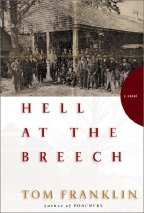Hell at the Breech
Tom Franklin
William Morrow/HarperCollins Publishers
US Hardcover First Edition
ISBN: 0-688-16741-1
318 Pages; $23.95
Publication Date: June, 2003
Date Reviewed: January 5, 2004
Reviewed by: Terry D'Auray © 2004

REFERENCES
COLUMNS
|
|
|
Hell at the BreechTom FranklinWilliam Morrow/HarperCollins PublishersUS Hardcover First EditionISBN: 0-688-16741-1318 Pages; $23.95Publication Date: June, 2003Date Reviewed: January 5, 2004Reviewed by: Terry D'Auray © 2004 |
|
|
REFERENCES |
COLUMNS |
Were it not for the excellent taste of Ed Kaufman at M for Mystery in making unusual and consistently high quality selections for his S&S I First Mystery Club, I would have never found this book, or, if I had found it, would never have read it. That would have been my loss. Tom Franklin, who has previously published only short stories - well regarded, award winning short stories - has created an amazing first novel that is both highly polished and unbearably raw.
'Hell at the Breech' is an historical novel based on a true incident of vigilante justice gone awry in backwoods Mitchum Beat, Alabama in 1897. It reads like an ode to Flannery O'Connor with black, Southern Gothic humor and even blacker misdeeds committed by misguided or just plain stupid people. Equally violent and brutal and deeply in tuned to the elemental human condition, Franklin's prose takes the reader on an unforgettable journey back in time. It's a journey you shouldn't miss.
The accidental murder of an aspiring politician in Mitchum Beat leads to the formation of a vigilante group headed by the murdered man's cousin Tooch. The gang, composed of ragtag, dirt poor, backwoods cotton farmers, calls itself 'Hell at the Breech'. To enlist support, they don hoods or smear their faces with ash, to progressively intimidate, drive off, or simply kill anyone who won't sign their pledge of allegiance, in blood. 'Hell at the Breech' pursues more than murdering justice, however. They are equally adept at robbery, thievery, arson, and the pursuit of their sacred salvation and fear-slayer-- moonshine. Set against this renegade group is aging Sheriff Billy Waite. Far too fond of drink, emotionally distanced from his wife and physically distanced from his son and often himself brutally violent, Waite is an unlikely hero. But he is one of the few men in this backward hole with a sense of compassion and respect not solely for the law, but for justice, who feels the responsibility of his position as both a heavy weight and an unavoidable spur to action.
Franklin tells his story at a controlled pace, in remarkably lush, evocative prose. From the opening scene of two teenage boys drowning a litter of puppies, he balances segments of gruesome, stomach-turning violence with equally powerful stories of fundamental human truth into an engrossing historical noir. His story turns on classic themes of good versus evil, greed and corruption, power and the frustration of powerlessness and the elemental forces that shape the human experience. Franklin's prose is fully up to the ambitious panoply of the novel - evocative and sensuous in descriptions of both the Alabama wilderness and the unbridled wildness of uneducated, primitive men. The novel is populated with uneducated and impoverished characters all scratching out a life in dirt-floored hovels - young boys eager to prove their mettle; unruly, wholly savage men relishing destruction and viciousness; an aging local hooker and the psychic Widow Gates. Each character has a story and each story is inexorably connected to the brutality of the outcome. Franklin metes out details of these characters and their lives, sometimes with warmth and embracing compassion, other times with exceptional, raw brutality. Dark doings are leavened by dark humor and sweet poignancy.
"Hell at the Breech" comes on slowly, smoothly immersing the reader in the times and the place as it progresses to the primitive and cruel actions that set up the inevitable confrontation at the novel's conclusion. Though you know exactly where this story is going, you are swept up and sucked in to this impoverished and isolated world, both totally absorbed and thoroughly appalled as the narrative unfolds. We are sometimes moved to tears at the poignancy of these people and their barren lives and other times lurched into stomach-clutching terror at the brutality they can commit but not control. It's only when the novel is finished, when breathing is back to normal, that you realize you have been on a remarkable journey with a masterful guide.